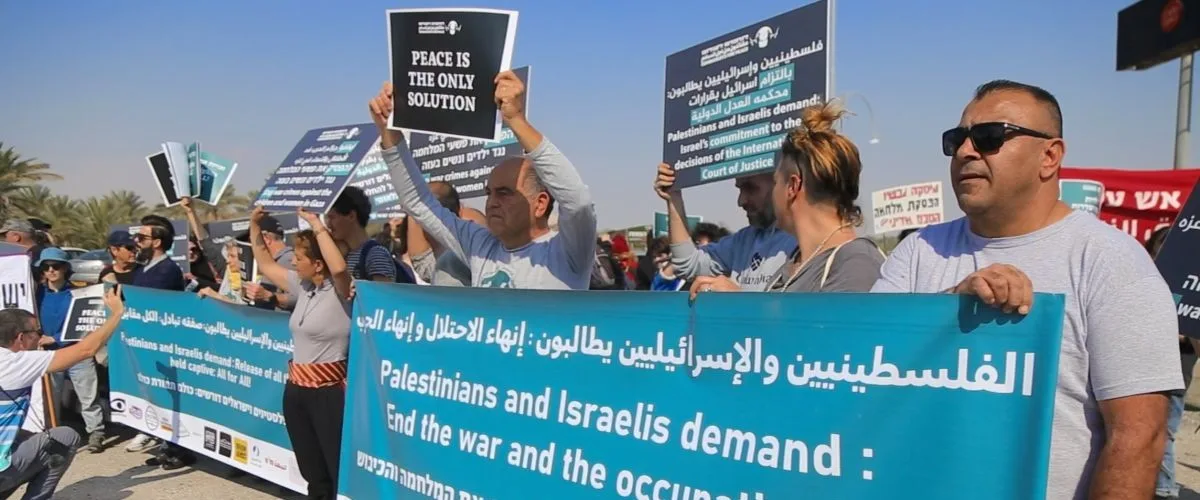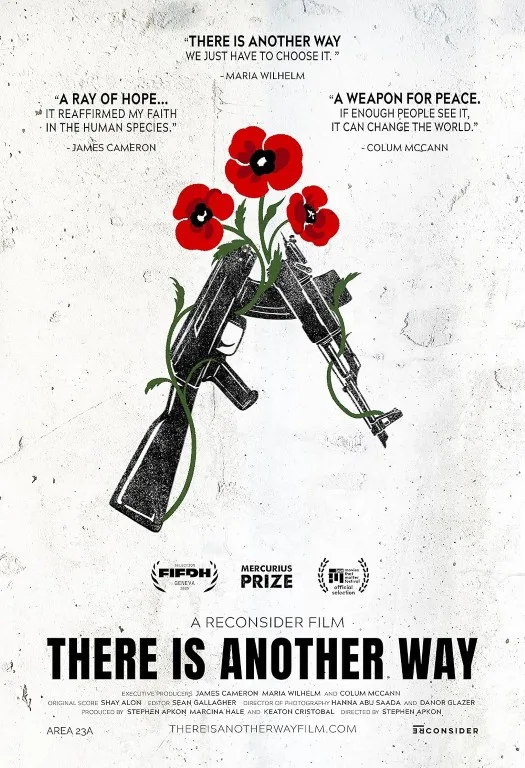On October 7, 2023, Hamas forces attacked Israel, killing over 2,500 Israelis and abducting 250 more, sparking a massive, ongoing retaliation in Gaza that is increasingly described as a genocide. Israel-Palestine is one of the rhetorical third rails of global politics—it always has been, really—and as such, it would seem an unlikely topic for filmmakers to try to present in a way that will satisfy everyone to some extent.
Stephen Apkon’s documentary “There Is Another Way” gives it a shot. The mission statement is right there in the title. Whether it succeeds will be up to the viewer. As is so often the case with these types of non-fiction films, the people who stand to benefit the most from watching it are likely to avoid it after hearing what it’s trying to do.
It’s definitely conceived as a teaching and healing tool that will reach as many viewers as possible, regardless of political leanings, and it plays that way. Some choices might irritate some viewers, such as the decision not to identify speakers onscreen until the very end section, which consists of footage from a joint memorial ceremony for Israelis and Palestinians killed since 2023, hosted by Combatants for Peace and The Parents Circle-Family Forum. The running time is a little over an hour, which means “There Is Another Way” could be considered either a long short film or a short feature, depending on an awards-giving group’s submission rules. (One of the 152 names listed in the “Thank You” section of the credits is this site’s Publisher, Chaz Ebert. Actor Stephen Lang is also in there.) Presumably to avoid turning away viewers whose sympathies don’t include Palestinians, the first half subtly avoids pointing out that the retaliation for Oct. 7 has killed more than ten times as many people as the initial attack (30,000 Palestinians had died when the movie’s final cut was locked; that number has grown since).
The movie’s vision expands and its presentation becomes more thorough in the second half, which includes disturbing images of Israeli settlers seizing land from Palestinians displaced by the retaliation, and IDF soldiers mugging for cameras as Gaza is bombed into rubble behind them. This will be a very rough viewing experience for those who have low tolerance for footage of graphic, real-life violence and raw testimony from both Israelis and Palestinians who have lost family members, and who break down in tears talking about how much they miss them and how pointless their deaths seem.
That last sentiment turns out to be the movie’s binding element. As grim as the subject matter is, there’s an inspirational takeaway: It doesn’t have to be like this. Survivors from both sides talk to the filmmakers and each other about the pain of loss and their determination to transform their misery into something positive by framing one of the most grotesque geopolitical conflagrations of modern times as the end product of societies in the grip of a kind of collective madness that’s largely impervious to reason. A bone-chilling bit of footage shows an Israeli woman at a pro-war gathering, waving a flag and bellowing, “We’re going to kill you all! All! All! One by One! F—-g Muslims!”
Yonatan Zeigen, the son of Canadian-Israeli peace activist Vivian Silver, who was killed by Hamas Oct. 7, is one of many interviewees who would seem like a candidate to support retaliatory violence but has turned his pain into peace activism instead. “The soldiers are victims, and armed Palestinian fighters are victims,” he says. “The conflict is not between Palestinians and Israelis,” says Combatants of Peace activist Ahmed Al-Helou. “It is between those who do evil and those who struggle for justice.” This is illustrated in the documentary’s glimpses of corpses, maimed survivors of rocket attacks, city blocks being bombed, weeping Israelis whose sons and daughters died in the retaliation, and Palestinians fleeing Israeli rocket attacks or racing towards meager airdrops of food and supplies. (The US support of Israel’s military is never mentioned, perhaps to avoid further inflaming those with entrenched rhetorical positions. One notable exception is in the end credits, which point out that since fall of 2023, the US has given $30 billion in military aid to Israel and $1 billion in humanitarian aid to Gaza.)
Israeli Michal HaLev, a mother whose son Laor Abramov was killed by Hamas, describes how appalling it was for her to receive letters and emails from fellow Israelis offering condolences while also promising to kill as many Palestinians as possible, as revenge for her loss. One such missive included a photo of a missile with Abramov’s name written on it. “There is nothing natural about losing a child,” she says. “I find one purpose for which to live, which is to seek out what I can do to help our wounded humanity heal.”
One of the more quietly haunting images in the movie is of a makeshift graveyard in Gaza, with rows of markers fashioned from any halfway gravestone-like household object that people could salvage from ruined homes. Does it still exist now? Or did bombs or bulldozers obliterate it?
“There are no victors in this war,” HaLev says near the end of the movie. “We have all already lost.”
Watch the film virtually today, June 12th. It opens in limited release in July.




















